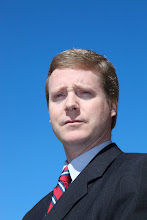The Employee Free Choice Act (EFCA), commonly known as “Card Check,” is the misnamed legislation promoted by Organized Labor to stop the hemorrhaging within union ranks. (From a high near 40 percent after World War II, union representation in the private sector has plummeted to just 7 percent today). It would make organizing a union infinitely easier by eliminating the current secret ballot vote used to determine whether employees wish to unionize.
Common sense tells us that whenever a secret ballot is not employed, many people will not vote their conscience. Instead, they fall victim to intimidation and arm-twisting, and end up casting a ballot in favor of the person whom they are strongly encouraged ---AKA “told” --- to support. The result is a rigged, Banana Republic election, anything but “Free Choice.”
The Republican Party, on both the state and national level, has vigorously opposed Card Check, not only because it is grossly unfair to companies, but much more important, because it would cavalierly discard that most fundamental American bedrock value: free and fair elections. It is a right that has been held sacred in this nation, and has allowed the people to chart their own course and make their own decisions, free of outside influence and intimidation.
Given this, it seems extremely hypocritical that the Republican State Committee of Pennsylvania --- while opposing Card Check --- jettisons free and fair voting for its own members by refusing to allow secret ballot votes on important issues, such as Party endorsements.
And now, on the eve of the meeting in which the Committee will vote whether to endorse a candidate for the U.S. Senate (or not endorse at all), that issue has become a firestorm that is only growing in intensity.
The big question centers on whether the Party will endorse millionaire Steve Welch, a favorite among several GOP leaders, including Republican Governor Tom Corbett. The problem many have with Welch is that he voted for Barack Obama in the 2008 Democratic primary and supported former Congressman Joe Sestak, a stalwart liberal consistently to the Left of Obama. Welch claims he left the GOP out of frustration that it wasn’t conservative enough, leaving more than a few Republicans perplexed.
(In an email to PoliticsPA this week, Sestak wrote of his meeting with Welch: “He expressed support of me and what I stood for. He seemed nice and, separately, supportive of the Democratic Party and its efforts.”)
So would the Party really risk massive damage to itself by endorsing an Obama-voter, and make the sin mortal by doing so without a secret ballot?
They can’t be that dumb.
But this being Pennsylvania’s Republican Party, all bets are off.
Should they endorse Welch, it will be a double whammy, throwing the entire Party into a quagmire from which it would be difficult to escape.
State Committee would cement the perception that its endorsements are behind-the-scenes deals by inside powerbrokers hell-bent on executing individual agendas --- the rank-and-file Party faithful be damned. More damaging, it would play out --- in full public view --- exactly how ruthlessly efficient Card Check tactics are, making unions blush with envy.
How could Party leaders possibly explain with a straight face that the process was fair, and that no political pressure and intimidation took place --- when Governor Corbett and certain State Committee leaders were openly pushing Welch? Would it really be plausible to believe that the message “do it for the Party, and do it for your Governor --- or else your political career stops here” wouldn’t be made loud and clear?
Even more telling, how could the Party explain Committee members’ change of heart in endorsing Welch after only one of five State Committee regional caucus straw polls voted for Welch as their candidate of choice? In other words, of the five regional “pre-election” votes that took place --- voted on by the very same people who are now being asked to change their vote and endorse Welch --- only one made Welch a winner. Significantly, Welch’s own Southeast Caucus refused to hold a straw poll, and Corbett was not even able to deliver his hometown Southwest Caucus for Welch.
This is by no means an indictment of Steve Welch. It has nothing to do with him, and everything to do with the Republican Party. Clearly, in this particular situation, the wisest course of action would be to ignore the Governor’s misguided endorsement and refuse to endorse any candidate.
In allowing grassroots Republicans across Pennsylvania to make their choice, free of Party endorsements, a civil war inside the GOP would be averted, and the best candidate --- the people’s choice --- would emerge to take on incumbent Bob Casey. And if Welch wins a non-endorsement primary, his victory would not be tainted with the perception that he “bought” his way to the nomination. Regardless of the outcome, no one can argue with the results if rank-and-file Republican voters make that decision.
Besides gaining immense credibility with many Republicans should it not endorse a candidate, State Committee could score a huge coup by then amending its bylaws to allow for that which is uniquely American: secret ballot elections.
Otherwise, it will become known as Republican State Committee, Local 666.
An accredited member of the media, Chris Freind is an independent columnist, television/radio commentator, and investigative reporter who operates his own news bureau, www.FreindlyFireZone.com His self-syndicated model has earned him the largest cumulative media voice in Pennsylvania. He can be reached at CF@FreindlyFireZone.com
